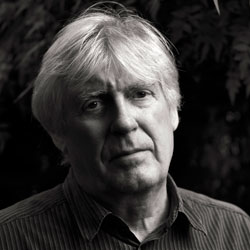Laid-up with all about me
a man could want: a stack of the cross-
hatched notebooks I always use,
a Stabilo pen,
a brand-new thriller that famously stole its plot
from The Spanish Tragedy, vodka,
a pineapple tub
of ice to sap (a little) the bright
fever that loosened my teeth, so I half-expected
to see them drop to the quilt
like sticky Chiclets,
laid-up like that, alone
you might say, but well provided for,
I felt a sleep coming on, so thick
I might have been sleeved in darkness; and next
fell into a dream quicker
than my eyes could close: in fact
I’d already declared for Bel-imperia
and was just getting down
past the damp in the crook of her knee
to those salty, pink petals
of crêpe-de-chine,
when a voice I recognised
had me up and out of there and back to my bed –
a hot, synaptic zip
that almost made me believe I’d woken up
until I saw the tattoo:
a letter to every finger neatly between
the knuckle joints,
as he collared the bottle and turned
a page or two of my notebooks. ‘Just here:
is this lorel or Lorelei? – each syllable sharp
as the detonations in ice
when you pour on vodka – ‘It’s plain
what’s fretting you, but look,
you’ll know it sure enough
when someone you claim to recognise climbs up
out of your bones
and legs it for the door
without so much as a kiss-
my-arse-goodbye (on a darkening day of “rain
moving in from the west”) or even a shred of song.’
Notes on the Poem
David Harsent weaves an underlying sense of unease, even menace through this and many of the poems in his 2008 Griffin Poetry Prize shortlisted collection Selected Poems 1969-2005. While poetry can comfort and shed gentle light on myriad subjects, it is often at its most potent making readers uncomfortable - which is not a bad thing. Let's observe Harsent's mastery and learn more about how he went on to wield it. In the fever dream that is "The Good Companion", the ailing narrator thinks he is armed with the remedies that will get him through a presumably passing illness. How interesting that they turn out to be nostrums, ingredients making matters worse, disorienting, increasingly troubling. How about a good book to distract from one's discomfort? Well ... "a brand-new thriller that famously stole its plot from The Spanish Tragedy" resurfaces in dream or hallucination about a woozy, interrupted encounter with that story's vengeful female protagonist. Well then, how about some soothing libation? The medicinal liquid of choice and its related components somehow connect disturbingly to a common subject of nightmares: the loss of one's teeth. The breadcrumb trail of troubling details are surely leading to some kind of discovery or meaning or revelation, aren't they? Fortunately, the underlying menace is coupled with lashings of caustic humour, culminating with ... It's plain what's fretting you, but look, you'll know it sure enough when someone you claim to recognise climbs up out of your bones and legs it for the door without so much as a kiss- my-arse-goodbye We don't really know who is delivering the message ... and no, it isn't plain what deeper worry is below the surface here. What a wicked punchline with which to wrap this fascinating poem. In 2008, the Griffin Poetry Prize judges noted in Harsent's poems "the haunting psychological situations that give you a novel’s worth of drama in a few lines." In 2012, when Harsent's collection Night won the prize, the judges that year noted his poetic explorations of "dream, terror and hidden impulse". Between the timeline of the poems collected in Selected Poems 1969-2005 and those in Night, Harsent's writing path took a turn both intriguing as a seeming departure from poetry, but also consistent with this dark current in his work. From 2006 to 2011, he crafted episodes of the enduringly popular British crime drama television series Midsomer Murders. The program is described as "featuring a mixture of lighthearted whimsy and dark humour", which sounds like an excellent match with Harsent's incisive literary skills. Don't think, by the way, that even writing under a pseudonym, Harsent's work on Midsomer Murders went unnoticed and unconnected to his poetry achievements. In 2017, the extremely clever London Review Bookshop posited a brilliant conspiracy theory that drew in Harsent as well as several other Griffin Poetry Prize winners and shortlisted poets ... and connected them all to (spoiler alert) Midsomer Murders.
